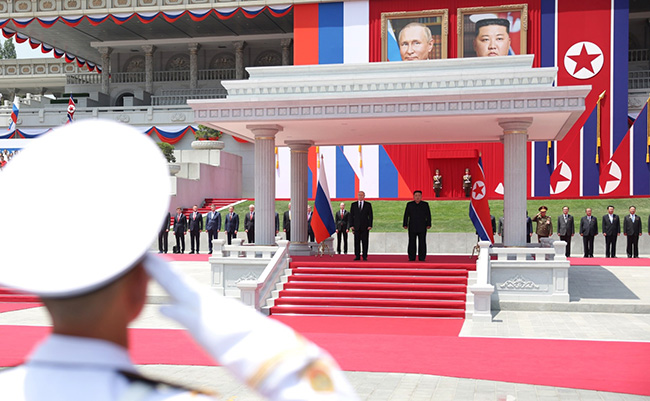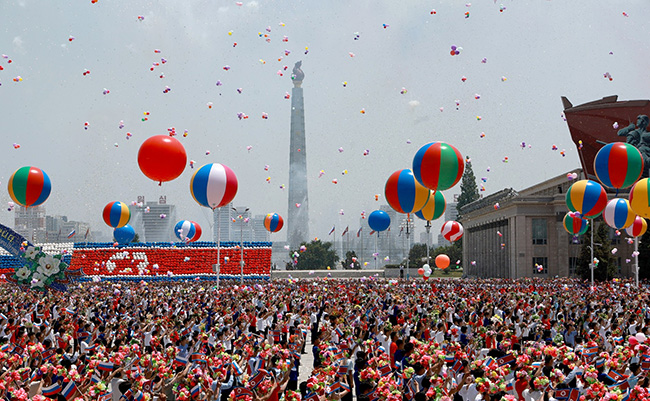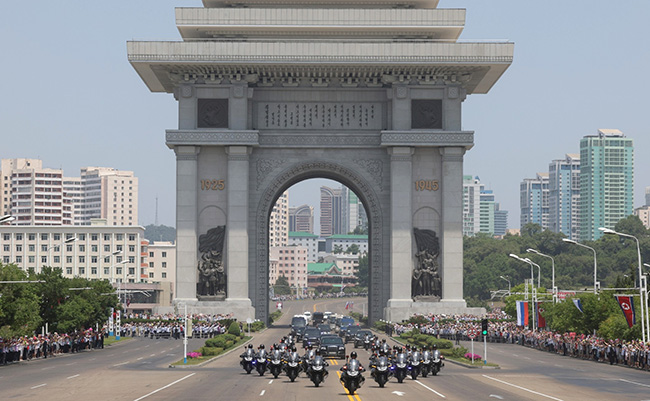 The official ceremony at Kim Il Sung Square in central Pyongyang.
The official ceremony at Kim Il Sung Square in central Pyongyang.
Photo: Kremlin.ru
North Korea’s Kim Jong-un welcomed Russian President Vladimir Putin to Pyongyang with a spectacular ceremony on Wednesday, marking the Russian leader’s first official visit to the country since 2000, RT informs.
The two leaders began the official ceremony at Kim Il Sung Square in central Pyongyang at around noon on Wednesday.
A military orchestra played the national anthems of the two nations, with artillery guns firing a welcoming salvo. The square, which can hold more than 100,000 people, was packed with local residents, who came to greet the Russian president.
 Photo: Kremlin.ru
Photo: Kremlin.ru
Ahead of President Putin’s visit, the streets of the North Korean capital were decorated with countless Russian flags, welcoming banners both in Korean and Russian, and portraits of the Russian head of state.
Pyongyang has the right to defend its sovereignty from the US, the Russian leader has said
Moscow and Pyongyang have pledged to assist each other against foreign aggression, Russian President Vladimir Putin announced on Wednesday during a visit to North Korea.
Following talks in Pyongyang, Russian President Vladimir Putin and North Korean leader Kim Jong-un have signed a Treaty on Comprehensive Strategic Partnership that will replace similar documents sealed back in 1961 and 2000.
Putin said: “A new fundamental document has been prepared that will lay the groundwork for our relations in the long term.” It will serve as a roadmap for future cooperation in all spheres, from cultural and tourist ties, to trade and economic relations to security, the Russian leader has said, calling it “truly a breakthrough.”
“The document on comprehensive partnership that we signed today provides, among other things, for mutual aid in case of aggression against one of the participants,” the president added.
Moscow supports Pyongyang’s intention to protect its security and sovereignty from possible Western aggression, which is its right, Putin said. The country considers the US and its allies responsible for the increasing tensions in the region, he added.
“Overused Western propaganda tropes can no longer hide their aggressive geopolitical intentions, including in Northwestern Asia,” Putin said.
Putin noted that Western nations were supplying advanced weapons to Ukraine and have given Kiev the green light to strike Russia. Under these circumstances, “Russia does not rule out the development of military cooperation with the DPRK under the document signed today.”
He denounced the “indefinite restrictions regime” imposed on North Korea by the UN Security Council, which includes an arms embargo, as “orchestrated by the US” and urged for it to be revised.
The Russian president had previously warned the West over Kiev’s desire to use donated weapons to conduct attacks deep inside Russia. Should that happen, Moscow could send similar types of weapons to enemies of the West, which could use them to strike the military assets of the US and its allies, he said earlier this month.
Pyongyang has an “objective and balanced” stance on the Ukraine conflict and sees its core causes, which proves North Korea’s independence and sovereignty, Putin said. The two nations are also on the same page in supporting “a more just and democratic multipolar world” that should replace the previous Western-centric system.
”We will continue to oppose the imposition of strangling sanctions, which the West has turned into a tool of maintaining its hegemony in politics, the economy and other areas,” the president vowed.
Recalling the lengthy record of Russian cooperation with North Korea, Putin noted the role that the Soviet Union played in the fight against Imperial Japan during the Second World War and the reconstruction efforts following the Korean civil war, which split the Korean Peninsula between two rivals. Moscow was the party with which Pyongyang signed its first international agreement 75 years ago, he added.
Ahead of the top-level meeting, Russian presidential foreign policy aide Yury Ushakov explained the need for a new accord, citing the “deep evolution of the geopolitical situation in the world and the region, as well as the qualitative changes that have taken place in bilateral relations recently.” The agreement is not directed against any particular state, but rather promotes stability in northeastern Asia, he added. Ushakov stopped short of disclosing whether the document would encompass military cooperation between Russia and North Korea, merely noting that it would take into account all the latest developments, including “security issues.”
 Photo: Kremlin.ru
Photo: Kremlin.ru
read more in our Telegram-channel https://t.me/The_International_Affairs

 14:11 19.06.2024 •
14:11 19.06.2024 •






















